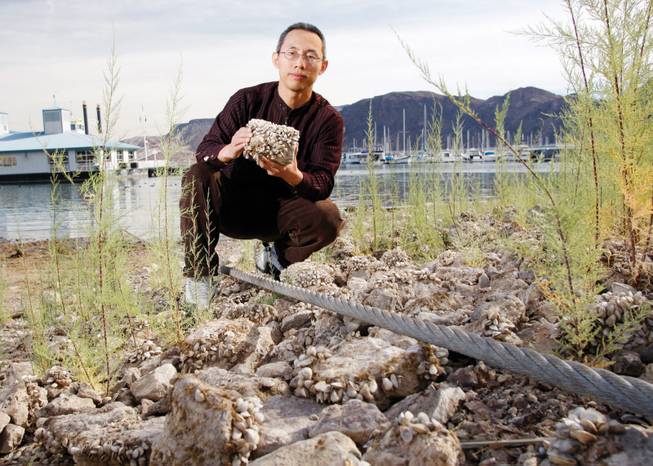
UNLV’s David Wong holds a rock covered with dead quagga mussels. The researcher’s goal is to eliminate or at least control the invasive, harmful mollusks in Lake Mead.
Monday, Nov. 9, 2009 | 2 a.m.
In Today's Sun
- Quagga mussels a toxic threat (11-9-09)
Sun Archives
- Wary of invasive species, hatchery suspends operations (1-20-2009)
- Mussels’ last meal (6-20-2008)
- Get rid of pest? Not if it turns tap water pink (7-21-2007)
- Mussels now contained but need monitoring (1-18-2007)
- Lake Mead mussels identified as quagga, not zebra (1-13-2007)
Sun Topics
Beyond the Sun
- UNLV School of Public Health: David Wong
- UNLV Impacts E-Newsletter: The Quagga Mussel Connundrum
- U.S. Geological Survey: Species Factsheet
David Wong came to Las Vegas to try to save it from an alien invasion.
The native of China has been working as a researcher at UNLV’s School of Community Health Sciences since July 2008 for one reason — because Southern Nevada is where the war to end all wars must be waged against quagga mussels, the little freshwater mollusks that threaten to clog and poison the region’s water systems.
Wong has for 15 years studied the effects of invasive mussel species in the United States. During the eight years leading up to his move to Nevada, Wong’s sights were zeroed in on a cousin of the quagga, the zebra mussel, and the ecological danger that species posed in the Great Lakes and Hudson River. He was a sidekick to the main mussel fighter there.
In early 2007 he read about the discovery of quagga mussels in Lake Mead, and found his own quest. He saw the quaggas as a disaster in the making “for the economy and the freshwater ecosystem in the Western states,” one that he could play a major role in trying to stop.
Now the biologist’s life’s work is “mitigating, monitoring and studying these invasive pests.”
Although he is dedicated to eradicating them, Wong has a level of admiration for his foe.
“They’re unique, so smart,” he says. They have moved across the country — from coast to coast — in a matter of years using lakes, rivers, boat hulls and even drinking-water pipes, despite widespread efforts to prevent it. They’re tough, too, he says. Their asymmetrical shells are razor-sharp. And although they’re tiny, he’s seen them shred the wet suits of more than one diver who underestimated them.
Wong’s approach to the quaggas is much like his personality: careful, patient, cunning.
“He’s generally a pretty quiet guy,” says his boss, Shawn Gerstenberger, executive associate dean of the School of Community Health Sciences. “That is until you get him talking about research. When he gets something he’s passionate about, he gets very animated and tries to get everyone involved in the discussion. The mussels are really one of those things. He’s on a mission to find out everything he can about them and find ways to use that to our advantage.”
Some researchers say poisoning the entire lake is the only sure way to kill off most, if not all, quaggas. One researcher suggested introducing quagga-killing bacteria to infested lakes. But that, like poisoning, would kill fish and wildlife in and around the lake and downstream — not to mention that it would compromise 90 percent of Las Vegas’ water supply as well as water used in Arizona, Southern California and Mexico.
Adding to the lake one or more types of fish that like to eat the quaggas might work — as long as they aren’t just as likely to eat something easier to digest. No one wants to add a fish that is going to crowd out the game fish or upset the ecological balance in an unexpected and detrimental way.
The fish idea is one of many that Wong is researching, but he’s taking a measured approach. Although he’s extremely keen on killing off the invasive mussels, he’s a careful, methodical and patient man. He’s not yet convinced that the lake can ever be completely rid of the quaggas — but if there is a way, he plans to find it and he wants to get his quagga killing right the first time.
He’s seeking out less complicated quagga-infested watering holes where he can experiment with ways to quash the quaggas without poisoning the water or killing off the sport fish.
He spends his weeks monitoring the Lake Mead quagga population, looking at growth rates and monitoring the mussels’ effects on the ecology and toxicity of the lake. He studies the population and mating habits of the quaggas, looking for vulnerabilities — so he can know the best time and way to deliver the coup de grâce to the underwater horde.

Join the Discussion:
Check this out for a full explanation of our conversion to the LiveFyre commenting system and instructions on how to sign up for an account.
Full comments policy